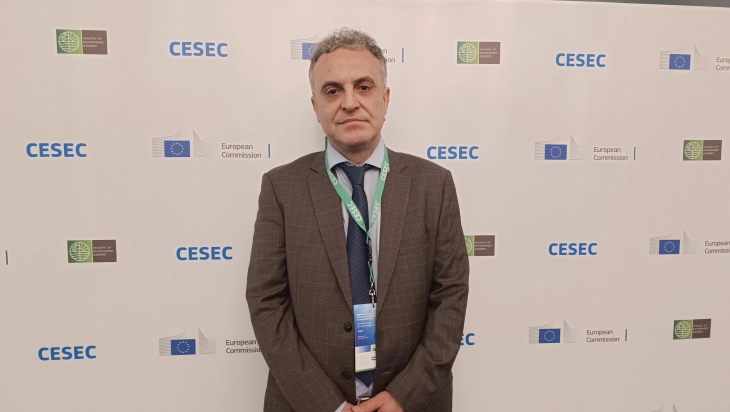Region has survived energy crisis and is now sailing into calmer waters, Nomagas CEO Rexhepi tells MIA
- The energy sector is in a much more stable state, the region has survived the energy crisis and is now sailing into calmer waters with stabilized prices, Nomagas CEO Bajram Rexhepi told MIA after a ministerial meeting of the High Level Group on Central and South-Eastern Europe Energy Connectivity (CESEC), taking place in Athens on Friday and Saturday.

Athens, 19 January 2024 (MIA) – The energy sector is in a much more stable state, the region has survived the energy crisis and is now sailing into calmer waters with stabilized prices, Nomagas CEO Bajram Rexhepi told MIA after a ministerial meeting of the High Level Group on Central and South-Eastern Europe Energy Connectivity (CESEC), taking place in Athens on Friday and Saturday.
In a conversation with MIA's Athens correspondent, Rexhepi stressed the importance of regional connection, mentioning the interconnector with Greece, which will utilize hydrogen in addition to natural gas, and noting that the construction of a regional power plant in TEC Negotino will be one of the most important energy projects in the country, also in terms of the energy crisis.
"This year, the energy sector is in a much more stable condition. There were very bad scenarios last year that the region would be left without natural gas, without electricity, due to the Russian invasion of Ukraine, but the region survived and currently the natural gas market and the electricity market are very stable. Of course, the prices have stabilized, so we can say that the region has survived the crisis and is now sailing into calmer waters in the sense that there will be stability, there will be sufficient capacity and quantities for natural gas and electricity, and of course no dramatic changes are expected in this important sector in the coming period," the Nomagas CEO said.

Regarding the interconnector with Greece, he explained that certain adjustments have been required, so that the interconnection line could utilize hydrogen in addition to natural gas.
"The necessary changes have been made in the specification of all the materials to be used, to make it ready for hydrogen transfer and this is very good news, because this project involves not only gas connection, but also hydrogen connection between the two countries. This is also in support to the plan of our Government for the construction of a huge regional power plant in TEC Negotino, as well as a hydrogen storage, so I believe it meets all the necessary conditions to be one of the most important energy projects in the country," Rexhepi pointed out.
According to his expectations, the ongoing tender procedures will be completed at the end of February and construction will be ready to start in the first half of March, so that the project can be operational by the end of 2025.
"It will enable supply not only from our eastern neighbor, but also from the southern corridor, which is extremely important for diversification of our supply sources, because we will also have access to all the LNG terminals that are currently operational in Greece. It will be a huge contribution to our supply of natural gas, but not only for us. With this project we will enable supply of our northern neighbors such as Serbia and Kosovo, and of course it will have a great contribution to the new map of supply for the whole of Eastern Europe, as well as our region of course," said Rexhepi.

Commenting on the ministerial meeting, also attended by the European Commissioner for Energy, he said it is extremely important, because it defines development directions, particularly in terms of regional connection. He added that the European supply map is changing after the war in Ukraine.
Rexhepi told MIA's Athens correspondent that the topic of releasing additional capacities in Bulgaria was also opened, given that "Gazprom" has leased the entire capacity on Bulgarian territory.
"We requested that the European directives be respected, i.e. those capacities that are booked and not used can be released, so that we have more opportunities for supply. Last year about 20 percent of those capacities were released, for the first time in the country we had competition in the supply, but of course it will be a great contribution to our supply if those additional capacities are also released, so that it will allow more traders and suppliers to have access to that pipeline, and finally the country can have independence in terms of natural gas supply," Rexhepi noted.
Central and South Eastern Europe Energy Connectivity (CESEC) works to accelerate the integration of central eastern and south-eastern European gas and electricity markets.
The CESEC high-level working group was set up by Austria, Bulgaria, Croatia, Greece, Hungary, Italy, Romania, Slovakia and Slovenia and the EU in February 2015. Slovakia is no longer a member of CESEC since 2021. They were joined later by eight contracting parties: Ukraine, the Republic of Moldova, Serbia, the Republic of North Macedonia, Albania, Bosnia and Herzegovina, Kosovo and Montenegro.
Sanja Ristovska







